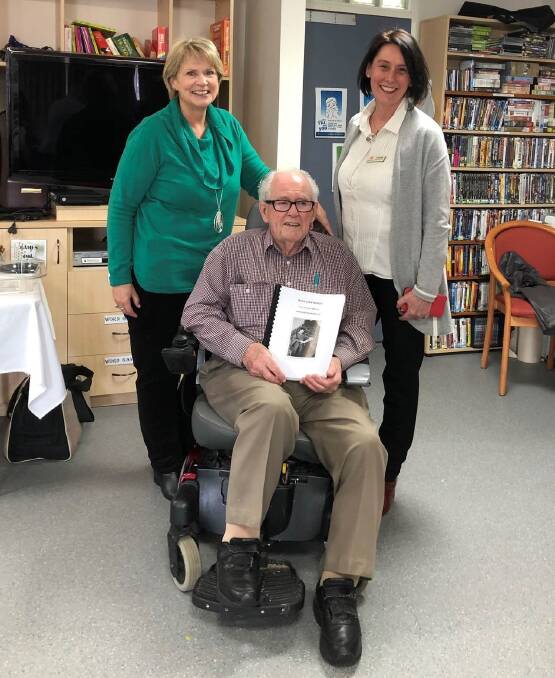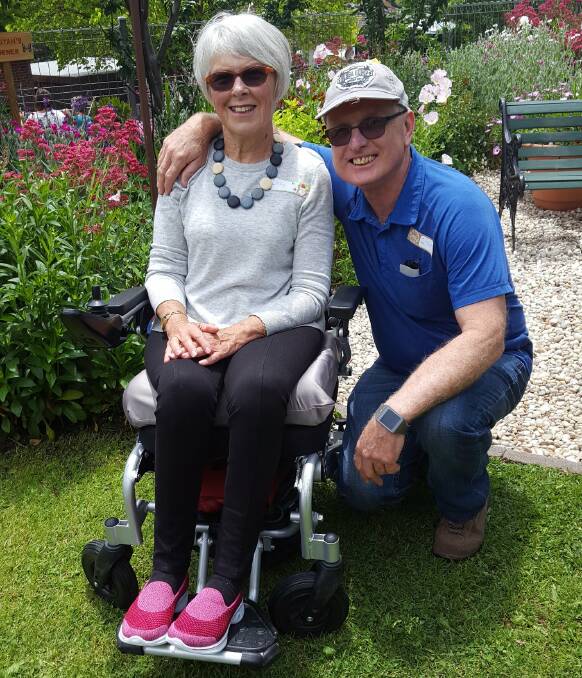A Canberra program that gives people with a life-limiting illness, including children, the opportunity to tell their life stories and, in doing so, reminisce, reflect, celebrate and perhaps reach a level of acceptance before they die, is in danger of closing, as its funding is due to run out at the end of March.
Subscribe now for unlimited access.
$0/
(min cost $0)
or signup to continue reading

Palliative Care ACT's well-regarded Life Stories program has seen trained volunteers record more than 50 life stories of people facing death, from a 96-year-old to a 12-year-old. The end result is passed on to loved ones.
Participant John McGee, who lives in Holt, was so thrilled with his story, he held a book launch for his family. Some stories have been more than 200 pages; one was a single page; a young girl with a congenital disorder recording one meaningful story before she died.
"She told one story that was really important to her, about a celebrity she'd met," Life Stories coordinator Liz Rhodes said.
"When you read it, it's just childhood on a page. It's her story. It's her voice."
And that's the critical thing. Life Stories is not about writing your own obituary.
It's more about the journey than the destination, the process of reviewing a life, in whatever way that comes out. Volunteers set a digital recorder in front of the person and let them just talk. The intention in transcribing is "to capture the client's voice - not to create an award winning book". It can be a full life run-down; or it can be a favourite story, warts and all, be it "dad swearing" or someone offering up little "fruity" asides
"It's not an interview; it's not an oral history, it's just stories," Mrs Rhodes said. "The volunteers transcribe them so it is their voice and you can really hear them."
But it could soon be coming to an end.
Palliative Care ACT CEO Tracy Gillard said it was grateful Suncorp had given $40,000 over the last two years so that Life Stories could flourish, but that money was due to run out at the end of March and the program was in danger of folding.
She said the preference was for community funding as the rest of their funding came from government.
Mrs Rhodes said research showed the process of reflection and diversion that was inherent in Life Stories could help reduce a person's pain and alleviate depression.
"People, when they start, focus on the book, on what they are leaving behind for their family, but when they start to tell their story, they're really surprised by how emotional they feel. And there's an awful lot of joy in reminiscing," she said.
This is about saying to people, 'Tell me about you. What have you done?'. It's kind of giving people permission to celebrate, the good and the bad.
- Life Stories coordinator Liz Rhodes
One daughter who used to visit her father in a nursing home was thrilled to see him transform from barely talking to not being able to tell his stories quickly enough, once he started his book.
The man also started "dreaming about being a kid on the street again", Mrs Rhodes said.
Another young mum preferred to answer a series of "quirky questions", from her favourite holiday to her most-hated meal, to leave some of her personality with her children.
Other people felt some validation of their life choices or comfort that they had, in fact, endured.
One lady who was telling her story about being in an abusive relationship reached some closure.
"She said, 'I realised I survived'," Mrs Rhodes said.
Marg (Margaret) van Belkom, of Mawson, participated in Life Stories in 2018, before she passed away from motor neurone disease in May, 2019, aged 67.
Her volunteer, Lisa, would visit Mrs van Belkom in her house a couple of times a week over several weeks. Telling her story was incredibly important as, in the final stages of her life, Mrs van Belkom lost the ability to speak.
Her husband Paul said the whole process of being involved in Life Stories was "cathartic".
"It was just so beneficial for Marg," he said.
"Marg always looked forward to Lisa coming to see her. that lifted her spirits, Lisa coming and them having their chats.
"Obviously, they talked about Marg's life but a lot of other discussions went on as well.
"It was good for me too. Any time Marg was uplifted, so was I."
Mrs van Belkom's story became a 100-plus page book of anecdotes and photos from her life. It's become a treasured family keepsake and copies have been made, including for their two daughters.

Mr van Belkom said the book was also read by nurses when his wife was admitted to Clare Holland House, letting them know more about her, in a very quick and easy way.
He could only hope Life Stories received the funding it needed.
"When someone is at death's door, to have someone interested in Marg's life, rather than her suffering and to come up with all these funny anecdotes...It was just a beautiful process," Mr van Belkom said.
Mrs Rhodes said if Life Stories was cut "it would be a really big loss for a lot of people".
"People who might need to get their lives in order and to reminisce and realise their lives had meaning," she said.
"It's not very often someone says, 'Sit down and tell me about you'.
"People who come to see you when you're sick are usually coming to see you about your illness. 'Have you opened your bowels today?', 'What's your pain level?'
"This is about saying to people, 'Tell me about you. What have you done?'. It's kind of giving people permission to celebrate, the good and the bad.
"It's so valuable and we're so privileged to be a part of it."
Labor Member for Fenner Dr Andrew Leigh mentions the Life Stories program in his upcoming book Reconnected, due to be launched in September, a follow-on from his 2010 book Disconnected.
The new book focuses on communities and individuals "bucking the trend" by encouraging connection and inclusion.
Dr Leigh said he did not know Life Stories was in danger of folding.
"I certainly hope it's able to continue, either through government or philanthropic support. It's a valuable program," he said.


